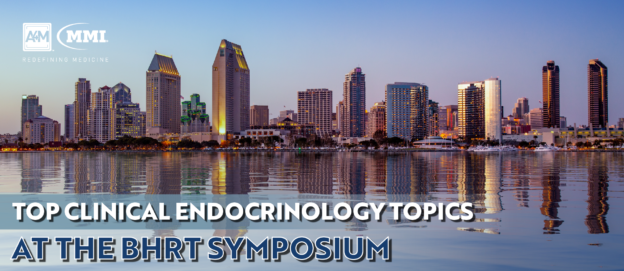A growing understanding of the intricacies of thyroid health, hormonal imbalances and therapies, as well as advancements in other facets of the burgeoning field of clinical endocrinology have drawn increased attention to novel treatment modalities and their potential to relieve –and even prevent – many symptoms of the aging process. To optimize treatment strategies and patient health outcomes, it is increasingly important for clinicians to stay up-to-date on the latest developments in hormone health. At one of our most popular events, the Bioidentical Hormone Replacement Therapy Symposium, a panel of experts will review the most recent and relevant research available, analyze the medical evidence surrounding hormone therapies, and delve into strategies for safely and effectively merging them into clinical practice. From thyroid optimization to growth hormone deficiency, attendees will have the opportunity to explore the most clinically current topics in the field through a series of expert-led sessions curated to provide a comprehensive overview of the latest updates in endocrinology.
Thyroid Optimization
Recent advances in thyroid hormone regulation have paved the way for a new paradigm of optimal diagnosis and care. A greater understanding of the pituitary gland and its complex role in physical health and overall wellbeing suggest adopting a more inclusive interpretation of thyroid health – which not only takes into account clinical symptoms, but also the relationship between all three thyroid parameters. Rather than generalizing diagnoses based on a set range of metrics, the new approach strives for thyroid optimization based on individual patient needs and outcomes to ensure appropriate TSH levels, symptom relief, and optimal thyroid health.
Learn more about the intricacies of TSH regulation and enhancing thyroid health at the Thyroid Optimization Session led by Dr. Ron Rothenberg during Day 2 of the symposium.
Adult Growth Hormone Deficiency
Increasingly recognized by the medical community, adult growth hormone deficiency (AGHD) manifests as a result of insufficient growth hormone production by the pituitary gland and has been linked to premature mortality. Although sometimes associated with childhood growth in height, growth hormone is necessary throughout all stages of life and impacts the psychological health and physical performance of adults. Growth hormone deficiency has also been linked to cardiovascular, metabolic, cognitive, and skeletal abnormalities – all of which can be mitigated with effective treatment.
Growth hormone replacement therapy strives to improve physical conditioning, strength, body composition, as well as mental wellbeing and quality of life by supplementing growth hormone in deficient individuals. While growth hormone therapy most commonly consists of daily subcutaneous injections of growth hormone, increasing investigation and use of PEGylated human growth hormone therapy promises to be a more convenient and efficient treatment option.
To review medical-based evidence for indications and uses of growth hormone, especially in cases of adult growth hormone deficiency, attend the Adult Growth Hormone Deficiency Session led by Dr. Andrew Jurow during Day 2 of the BHRT event.
Hypothalamic Pituitary Adrenal Axis Dysfunction
Previously referred to as “adrenal fatigue”, the disrupted stress response known as hypothalamic pituitary adrenal axis dysfunction is one of the many health repercussions of chronic stress. Eroding resilience and depleting metabolic reserve, an over-active stress response causes changes in cortisol production and rhythm, as well as in the production of other hormones and neurotransmitters – such as melatonin, DHEA, epinephrine. Although over 20% of primary care patients complain of fatigue, conventional medicine presently holds limited knowledge of efficacious treatment strategies for HPA axis dysregulation.
The current literature regarding causes of HPA axis dysfunction as well as the implementation protocols for treatment of the condition will be discussed at the Hypothalamic Pituitary Adrenal Axis Dysfunction Session led by Dr. Andrew Jurow during Day 3 of the event.
Common Female BHRT Problems
Although still a burgeoning field with a growing body of scientific evidence, bioidentical hormone replacement therapy (BHRT) has gathered the attention of the medical community and general public affected by hormone imbalances. Identical in chemical composition and molecular structure to biologically produced hormones, bioidentical hormone compounds have grown in popularity as a more natural alternative to traditional hormone replacement therapy (HRT) for both men and women. Promoted as safer and more effective than FDA-approved hormones, these compounds can prove helpful in the treatment of a multitude of hormonal imbalances.
To learn more about the indications of this treatment and to evaluate clinical scenarios representing common hormone imbalances in female BHRT, attend the Common Female BHRT Problems – Case Studies Session led by Dr. Barbie Barrett and Dr. Kris Hart during Day 2 of the symposium.
Bioidentical Hormone Replacement Therapy Symposium
As part of the A4M September Event in San Diego, California, the BHRT Symposium will allow attendees to fully immerse themselves in the latest advancements and research in the field of clinical endocrinology. Participants will leave the three-day, expert-led conference with a comprehensive understanding of contemporary hormone therapies, ready to integrate the latest treatment protocols and strategies into their practice.
Join hundreds of other leading health professionals in San Diego between September 25-28th at one of our most widely attended events in integrative medicine by registering for the BHRT Symposium today.

